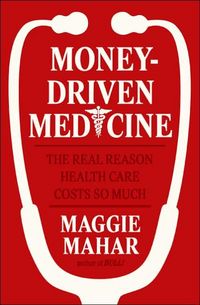

Purchase
The Real Reason Health Care Costs So Much
HarperBusiness
May 2006
On Sale: May 9, 2006
480 pages
ISBN: 006076533X
EAN: 9780060765330
Hardcover
Add to Wish List
Non-Fiction
Why is medical care in the United States so expensive? For
decades, Americans have taken it as a matter of faith that
we spend more because we have the best health care system
in the world. But as costs levitate, that argument becomes
more difficult to make. Today, we spend twice as much as
Japan on health care—yet few would argue that our health
care system is twice as good. Instead, startling new evidence suggests that one out of
every three of our health care dollars is squandered on
unnecessary or redundant tests; unproven, sometimes
unwanted procedures; and overpriced drugs and devices that,
too often, are no better than the less expensive products
they have replaced. How did this happen? In Money-Driven Medicine, Maggie Mahar
takes the reader behind the scenes of a $2 trillion
industry to witness how billions of dollars are wasted in a
Hobbesian marketplace that pits the industry's players
against each other. In remarkably candid interviews,
doctors, hospital administrators, patients, health care
economists, corporate executives, and Wall Street analysts
describe a war of "all against all" that can turn
physicians, hospitals, insurers, drugmakers, and device
makers into blood rivals. Rather than collaborating,
doctors and hospitals compete. Rather than sharing
knowledge, drugmakers and device makers divide value.
Rather than thinking about long-term collective goals, the
imperatives of an impatient marketplace force health care
providers to focus on short-term fiscal imperatives. And so
investments in untested bleeding-edge medical technologies
crowd out investments in information technology that might,
in the long run, not only reduce errors but contain costs. In theory, free market competition should tame health care
inflation. In fact, Mahar demonstrates, when it comes to
medicine, the traditional laws of supply and demand do not
apply. Normally, when supply expands, prices fall. But in
the health care industry, as the number and variety of
drugs, devices, and treatments multiplies, demand rises to
absorb the excess, and prices climb. Meanwhile, the
perverse incentives of a fee-for-service system reward
health care providers for doing more, not less. In this superbly written book, Mahar shows why doctors must
take responsibility for the future of our health care
industry. Today, she observes, "physicians have been
stripped of their standing as professionals: Insurers
address them as vendors ('Dear Health Care Provider'),
drugmakers and device makers see them as customers (someone
you might take to lunch or a strip club), while . . .
consumers (aka patients) are encouraged to see their
doctors as overpaid retailers. . . . Before patients can
reclaim their rightful place as the center—and indeed as
the raison d'être—of our health care system," Mahar
suggests, "we must once again empower doctors . . . to
practice patient-centered medicine—based not on corporate
imperatives, doctors' druthers, or even patients' demands,"
but on the best scientific research available.
Comments
No comments posted.
Registered users may leave comments.
Log in or register now!
| 


 © 2003-2025 off-the-edge.net
all rights reserved Privacy Policy
© 2003-2025 off-the-edge.net
all rights reserved Privacy Policy